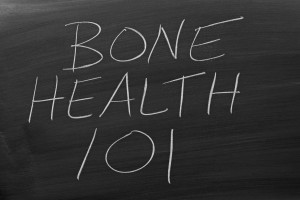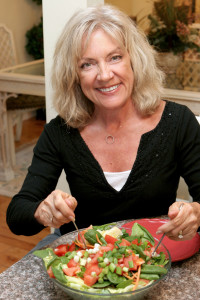Bone Health for Women Over Age 50
 According to the National Osteoporosis Foundation (NOF), approximately 8 million women in the United States have osteoporosis, a disease that can cause bones to break with something as unavoidable as a sneeze. All women should be aware of the bone health risks they face over age 50. As women age, and particularly during the 5 to 7 years following menopause, they can lose up to 20 percent of their bone density due to decreasing estrogen levels, making their bones more fragile, and putting them at greater risk of injury. Read on to learn about the bone health risks women face after age 50, and what you can do to protect your bones at age 50, and well into the future.
According to the National Osteoporosis Foundation (NOF), approximately 8 million women in the United States have osteoporosis, a disease that can cause bones to break with something as unavoidable as a sneeze. All women should be aware of the bone health risks they face over age 50. As women age, and particularly during the 5 to 7 years following menopause, they can lose up to 20 percent of their bone density due to decreasing estrogen levels, making their bones more fragile, and putting them at greater risk of injury. Read on to learn about the bone health risks women face after age 50, and what you can do to protect your bones at age 50, and well into the future.
Bone Health Risk Factors and Your Healthy Bone Protection Plan
It’s never too late to make the types of healthy lifestyle changes needed to protect your bone health. Follow these tips below to mitigate the chances of developing osteoporosis or other bone health issues as you age.
- Obtain a bone density test from your doctor to assess your current bone health. All women should receive a bone density test during menopause, or earlier, depending on the presence of certain health factors, to determine their risk of bone health complications.
- Consume plenty of calcium. 99 percent of the calcium your body needs is stored in your bones. Women over 50 need about 1,200 milligrams of calcium per day to maintain healthy bones.
- Consume plenty of vitamin D. Just like calcium, vitamin D is essential to maintaining healthy bones as it helps to aid in calcium absorption. Without enough vitamin D, women may lose up to 4 percent of their skeletal mass every year. To maintain healthy vitamin D levels, seek out fortified dairy products, leafy greens, and natural sunlight.
- Eat more fresh vegetables and fruits. In addition to vitamin D, fruits and vegetables offer high levels of other nutrients that are key for bone health, such as vitamin K, vitamin C, potassium, magnesium, and several B vitamins.
- Add supplements as needed. Talk to your doctor about supplementing your diet to achieve the necessary vitamins and minerals. Women ages 19 to 50 need about 1,000 milligrams of calcium and 600 international units (IUs) of vitamin D per day. After menopause, or around age 50, women need about 1,200 milligrams of calcium a day, and over age 70, women need about 800 IUs of vitamin D.
- Stay active. Throughout your life, to build and maintain healthy bones, stay active with weight-bearing exercises and activities that are conducted standing up, such as running, walking, aerobics, and dancing. At least 30 minutes of activity most days is optimal for bone health.
- Maintain a healthy weight. Women who are underweight are at a higher risk of having weaker bones, putting them at a greater risk of breakage.
- Reduce caffeine. Caffeine can cause your body to eliminate calcium more quickly. Reducing your consumption of caffeinated coffee, tea, soda, and caffeinated energy drinks, mitigates these effects.
- Quit smoking. As if you didn’t need another reason to quit smoking, tobacco use is the number one cause of bone loss and bone fractures in women over age 40.
- Moderate alcohol consumption. Women who drank alcohol heavily during their body’s formative teenage years may suffer from irreversible skeletal damage and be at a greater risk of developing osteoporosis as an adult. On the other hand, moderate alcohol consumption, such as a glass of wine per day in adulthood, may help to protect bones. In sum, if you’re going to drink alcohol, simply drink moderately and don’t overindulge—at any age.
For more information about maintaining optimal bone health, or to schedule a bone density test, talk to your doctor. He or she will help you understand your unique risk factors, and the lifestyle changes you can make now for healthier bones in your future.
Chouchani, Sayegh and Robinson MD is a top OB-Gyn practice located in Western New York. We are currently accepting new patients. Give us a call today to schedule your first visit. We look forward to meeting you.
More
